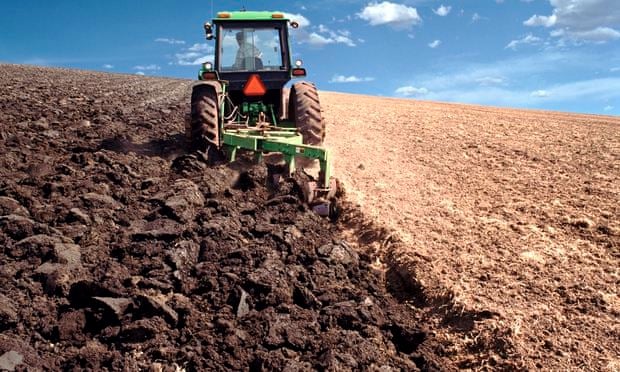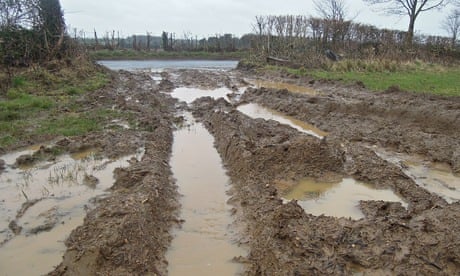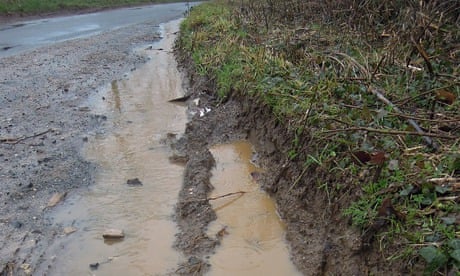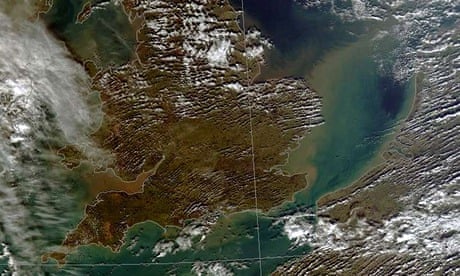Down to Earth Disaster
We’re treating soil like dirt.
It’s a fatal mistake, as our lives
depend on it

War,
pestilence, even climate change, are trifles by comparison. Destroy the soil
and we all starve
It’s literally and – it seems – metaphorically, beneath us. To judge by its absence from the media, most journalists consider it unworthy of consideration. But all human life depends on it. We knew this long ago, but somehow it has been forgotten. As a Sanskrit text written in about 1500BC noted: “Upon this handful of soil our survival depends. Husband it and it will grow our food, our fuel and our shelter and surround us with beauty. Abuse it and the soil will collapse and die, taking humanity with it.”
The issue hasn’t changed, but we have. Landowners around the world are now engaged in an orgy of soil destruction so intense that, according to the UN’s Food and Agriculture Organisation, the world on average has just 60 more years of growing crops. Even in Britain, which is spared the tropical downpours that so quickly strip exposed soil from the land, Farmers Weekly reports, we have “only 100 harvests left”.
Landowners around the world are now engaged
in an orgy of soil destruction
To keep up with global food demand, the UN estimates, 6m hectares (14.8m acres) of new farmland will be needed every year. Instead, 12m hectares a year are lost through soil degradation. We wreck it, then move on, trashing rainforests and other precious habitats as we go. Soil is an almost magical substance, a living system that transforms the materials it encounters, making them available to plants. That handful the Vedic master showed his disciples contains more micro-organisms than all the people who have ever lived on Earth. Yet we treat it like, well, dirt.
The techniques that were supposed to feed the world threaten us with starvation. A paper just published in the journal Anthropocene analyses the undisturbed sediments in an 11th-century French lake. It reveals that the intensification of farming over the past century has increased the rate of soil erosion sixtyfold.
Another paper, by researchers in the UK, shows that soil in allotments – the small patches in towns and cities that people cultivate by hand – contains a third more organic carbon than agricultural soil and 25% more nitrogen. This is one of the reasons why allotment holders produce between four and 11 times more food per hectare than do farmers.
 Whenever I
mention this issue, people ask: “But surely farmers have an interest in looking
after their soil?” They do, and there are many excellent cultivators who seek
to keep their soil on the land. There are also some terrible farmers, often
absentees, who allow contractors to rip their fields to shreds for the sake of
a quick profit. Even the good ones are hampered by an economic and political
system that could scarcely be better designed to frustrate them.
Whenever I
mention this issue, people ask: “But surely farmers have an interest in looking
after their soil?” They do, and there are many excellent cultivators who seek
to keep their soil on the land. There are also some terrible farmers, often
absentees, who allow contractors to rip their fields to shreds for the sake of
a quick profit. Even the good ones are hampered by an economic and political
system that could scarcely be better designed to frustrate them.Few sights are as gruesome as the glee with which the NFU celebrated the death last year of the European soil framework directive, the only measure with the potential to arrest our soil-erosion crisis. The NFU, supported by successive British governments, fought for eight years to destroy it, then crowed like a shedful of cockerels when it won. Looking back on this episode, we will see it as a parable of our times.
Soon after that, the business minister, Matthew Hancock, announced that he was putting “business in charge of driving reform”: trade associations would be able “to review enforcement of regulation in their sectors.” The NFU was one the first two bodies granted this privilege. Hancock explained that this “is all part of our unambiguously pro-business agenda to increase the financial security of the British people.” But it doesn’t increase our security, financial or otherwise. It undermines it.
The government’s deregulation bill, which has now almost completed its passage through parliament, will force regulators – including those charged with protecting the fabric of the land – to “have regard to the desirability of promoting economic growth”. But short-term growth at the expense of public protection compromises long-term survival. This “unambiguously pro-business agenda” is deregulating us to death.
There’s no longer even an appetite for studying the problem. Just one university – Aberdeen – now offers a degree in soil science. All the rest have been closed down.
This is what topples civilisations. War and pestilence might kill large numbers of people, but in most cases the population recovers. But lose the soil and everything goes with it.
Now, globalisation ensures that this disaster is reproduced everywhere. In its early stages, globalisation enhances resilience: people are no longer dependent on the vagaries of local production. But as it proceeds, spreading the same destructive processes to all corners of the Earth, it undermines resilience, as it threatens to bring down systems everywhere.
Short-term growth at the expense of public
protection compromises long-term survival
Almost all other issues are superficial by comparison. What appear to be great crises are slight and evanescent when held up against the steady trickling away of our subsistence.
The avoidance of this issue is perhaps the greatest social silence of all. Our insulation from the forces of nature has encouraged a belief in the dematerialisation of our lives, as if we no longer subsist on food and water, but on bits and bytes. This is a belief that can be entertained only by people who have never experienced serious hardship, and who are therefore unaware of the contingency of existence.
It’s not as if we are short of solutions. While it now seems that ploughing of any kind is incompatible with the protection of the soil, there are plenty of means of farming without it. Independently, in several parts of the world, farmers have been experimenting with zero-tillage (also known as conservation agriculture), often with extraordinary results.
There are dozens of ways of doing it: we need never see bare soil again. But in the UK, as in most rich nations, we have scarcely begun to experiment with the technique, despite the best efforts of the magazine Practical Farm Ideas.
Even better are some of the methods that fall under the heading of permaculture – working with complex natural systems rather than seeking to simplify or replace them. Pioneers such as Sepp Holzer and Geoff Lawton have achieved remarkable yields of fruit and vegetables in places that seemed unfarmable: 1,100m above sea level in the Austrian alps, for example, or in the salt-shrivelled Jordanian desert.
But, though every year our government spends £450m on agricultural research and development – much of it on techniques that wreck our soils – there is no mention of permaculture either on the websites of the two main funding bodies (NERC and BBSRC) or in any other department.
The macho commitment to destructive short-termism appears to resist all evidence and all logic. Never mind life on Earth; we’ll plough on regardless.
How we ended up paying farmers to flood our homes
The UK government let
the farming lobby rip up the rulebook on soil protection – and now we are
suffering the consequences
That's what I saw on Tuesday. On Friday, I travelled to the source of the Thames. Within 300 metres of the stone that marked it were ploughed fields, overhanging the catchment, left bare through the winter and compacted by heavy machinery. Muddy water sluiced down the roads. A few score miles downstream it will reappear in people's living rooms. You can see the same thing happening across the Thames watershed: 184 miles of idiocy, perfectly calibrated to cause disaster.
Two realities, perennially denied or ignored by members of this government, now seep under their doors. In September the environment secretary, Owen Paterson, assured us that climate change "is something we can adapt to over time and we are very good as a race at adapting". If two months of severe weather almost sends the country into meltdown, who knows what four degrees of global warming will do?
The second issue, once it trickles into national consciousness, is just as politically potent: the government's bonfire of regulations.

'Mud
pours straight off this field near the source of the Thames. Tomorrow it will
end up in people's houses.' Photograph:
George Monbiot
Six weeks before the floods arrived, a scientific journal called Soil Use and Management published a paper warning that disaster was brewing. Surface water run-off in south-west England, where the Somerset Levels are situated, was reaching a critical point. Thanks to a wholesale change in the way the land is cultivated, at 38% of the sites the researchers investigated, the water – instead of percolating into the ground – is now pouring off the fields.
Farmers have been ploughing land that was previously untilled and switching from spring to winter sowing, leaving the soil bare during the rainy season. Worst of all is the shift towards growing maize, whose cultivated area in this country has risen from 1,400 hectares to 160,000 since 1970.
In three quarters of the maize fields in the south-west, the soil structure has broken down to the extent that they now contribute to flooding. In many of these fields, soil, fertilisers and pesticides are sloshing away with the water. And nothing of substance, the paper warned, is being done to stop it. Dated: December 2013.
Maize is being grown in Britain not to feed people, but to feed livestock and, increasingly, the biofuel business. This false solution to climate change will make the impacts of climate change much worse, by reducing the land's capacity to hold water.
The previous government also saw it coming. In 2005 it published a devastating catalogue of the impacts of these changes in land use. As well as the loss of fertility from the land and the poisoning of watercourses, it warned, "increased run-off and sediment deposition can also increase flood hazard in rivers". Maize, it warned, is a particular problem because the soil stays bare before and after the crop is harvested, without the stubble or weeds required to bind it. "Wherever possible," it urged, "avoid growing forage maize on high and very high erosion risk areas."
The Labour government turned this advice into conditions attached to farm subsidies. Ground cover crops should be sown under the maize and the land should be ploughed, then resown with winter cover plants within 10 days of harvesting, to prevent water from sheeting off. So why isn't this happening in Somerset?
Because the current government dropped the conditions. Sorry, not just dropped them. It issued – wait for it – a specific exemption for maize cultivation from all soil conservation measures.

As the
water runs off the land, it takes the silt with it. Photograph: George Monbiot
It's hard to get your head round this. The crop which causes most floods and does most damage to soils is the only one which is completely unregulated.
When soil enters a river we call it silt. A few hundred metres from where the soil is running down the hills, a banner over the River Parrett shouts: "Stop the flooding, dredge the rivers." Angry locals assail ministers and officials with this demand. While in almost all circumstances, dredging causes more problems than it solves, and though, as even Owen Paterson admits, "increased dredging of rivers on the Somerset Levels would not have prevented the recent widespread flooding", there's an argument here for a small amount of dredging at strategic points.
But to do it while the soil is washing off the fields is like trying to empty the bath while the taps are running.

This
satellite image, taken on 16 February, shows where our soil goes once it's
washed off our fields. Photograph: Dundee Satellite Receiving Station
So why did government policy change? I've tried asking the environment department: they're as much use as a paper sandbag. But I've found a clue. The farm regulation task force demanded a specific change: all soil protection rules attached to farm subsidies should become voluntary. They should be downgraded from a legal condition to an "advisory feature". Even if farmers do nothing to protect their soil, they should still be eligible for public money.
You might have entertained the naive belief that in handing out billions to wealthy landowners we would get something in return. Something other than endless whining from the National Farmers' Union. But so successfully has policy been captured in this country that Defra – which used to stand for the Department for Environment, Food and Rural Affairs – now means Doing Everything Farmers' Representatives Ask. We pay £3.6bn a year for the privilege of having our wildlife exterminated, our hills grazed bare, our rivers polluted and our sitting rooms flooded.
Yes, it's a parable all right, a parable of human folly, of the kind that used to end with 300 cubits of gopher wood and a journey to the mountains of Ararat. Antediluvian? You bet it is.
From The Guardian @ http://www.theguardian.com/commentisfree/2015/mar/25/treating-soil-like-dirt-fatal-mistake-human-life
and http://www.theguardian.com/commentisfree/2014/feb/17/farmers-uk-flood-maize-soil-protection
For more information about soil see http://nexusilluminati.blogspot.com/search/label/soil
- Scroll down
through ‘Older Posts’ at the end of each section
Hope you like this
not for profit site -
It takes hours of work every day by
a genuinely incapacitated invalid to maintain, write, edit, research,
illustrate and publish this website from a tiny cabin in a remote forest
Like what we do? Please give anything
you can -
Contribute any amount and receive at
least one New Illuminati eBook!
(You can use a card
securely if you don’t use Paypal)
Please click below -
Spare Bitcoin
change?
Xtra Image by R. Ayana – https://farm8.staticflickr.com/7044/6955901697_72c5a5e22b_k.jpg
For further enlightening
information enter a word or phrase into the random synchronistic search box @
the top left of http://nexusilluminati.blogspot.com
And see
New Illuminati – http://nexusilluminati.blogspot.com
New Illuminati on Facebook - https://www.facebook.com/the.new.illuminati
New Illuminati Youtube Channel - http://www.youtube.com/user/newilluminati
New Illuminati on Google+ @ https://plus.google.com/115562482213600937809/posts
New Illuminati on Twitter @ www.twitter.com/new_illuminati
New Illuminations –Art(icles) by
R. Ayana @ http://newilluminations.blogspot.com
The Her(m)etic Hermit - http://hermetic.blog.com
DISGRUNTLED SITE ADMINS PLEASE NOTE –
We provide a live link to your original material on your site (and
links via social networking services) - which raises your ranking on search
engines and helps spread your info further! This site is
published under Creative Commons Fair Use Copyright (unless an individual
article or other item is declared otherwise by the copyright holder). Reproduction
for non-profit use is permitted & encouraged, - if you give attribution to the work & author
and include all links in the original (along with this or a similar notice).
Feel free to make non-commercial hard (printed) or software copies or
mirror sites - you never know how long something will stay glued to the web –
but remember attribution!
If you like what you see, please send a donation (no amount is too
small or too large) or leave a comment – and thanks for reading this far…
Live long and prosper! Together we can create the best of all possible
worlds…
From the New Illuminati – http://nexusilluminati.blogspot.com



